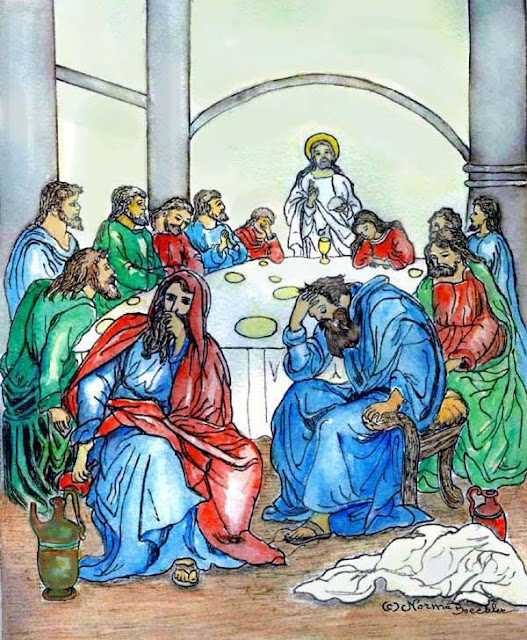Mid-Week Lenten Vespers, April 13, 2011
Pastor Gregory L. Jackson
http://www.ustream.tv/channel/bethany-lutheran-worship
Bethany Lutheran Worship, 7 PM Central Time
The Hymn # 291 Lamp of Our Feet 4:3
The Order of Vespers p. 41
The Psalmody Psalm 23 p. 128
The Lection The Passion History
The Sermon Hymn #364 How Sweet the Name 4:18
The Sermon – The Sword of the Spirit
The Prayers
The Lord’s Prayer
The Collect for Grace p. 45
The Hymn # 285 How Precious Is 4:59
KJV Hebrews 4:12 For the word of God is quick, and powerful, and sharper than any twoedged sword, piercing even to the dividing asunder of soul and spirit, and of the joints and marrow, and is a discerner of the thoughts and intents of the heart. 13 Neither is there any creature that is not manifest in his sight: but all things are naked and opened unto the eyes of him with whom we have to do. 14 Seeing then that we have a great high priest, that is passed into the heavens, Jesus the Son of God, let us hold fast our profession. 15 For we have not an high priest which cannot be touched with the feeling of our infirmities; but was in all points tempted like as we are, yet without sin. 16 Let us therefore come boldly unto the throne of grace, that we may obtain mercy, and find grace to help in time of need.
Lenski:
Do not Underestimate the Word of God, v. 12, 13.
12) This appendix is vital as the concluding word of both the warning voiced in chapter 3 and the promise given in 4:1–11. It is so essential because not only the warning and the promise are based on the Word of God as being “my voice,” Ps. 95 (see 3:8–11), but also because all that this epistle contains from 1:1 onward (“God spoke”) and will contain in the following chapters is based directly on God’s Word. So the writer says: Let there be no illusion in you, my readers, regarding this Word of God and what it says about Jesus; let no one think that disbelieving or disobeying this Word is a light matter. The writer has dwelt especially on Ps. 95:11 (3:8, 11; 4:3, 4), God’s oath, a most terrible Word of God. He now stresses the full power of the Word in its damning force. He has likewise dwelt on Ps. 95:7b plus 11: “Today” and “my rest,” with all the promise that lies in this Word (3:8, 15; 4:3–8). This, too, leads him to stress the power of the Word, the blessed promise of which is so mighty.
Lenski, R. C. H.: The Interpretation of the Epistle to the Hebrews and of the Epistle of James. Columbus, O. : Lutheran book concern, 1938, S. 139
There is a major gulf between the Lutheran interpretation of the Scriptures and the Pietistic/Reformed view of the Scriptures.
Many people overlook it because the difference has been obscured by those who favor un-Lutheran and anti-Lutheran theology.
Here is the difference.
Luther, following the plain, clear truth of the Word, always emphasized the Word of God accomplishing His will. That is why he and the Lutheran Reformers always fought for the pure Word, because it belongs to God alone and not to man. We are privileged to have the Bible, but we do not have a license to change its meaning to suit ourselves.
The Reformed view, from Calvin, is this – God’s Word is dead by itself. We must make it come alive and be relevant (real, relational) to others. That places the burden on man to make the Word of God reasonable and attractive. Man’s effort is absolutely necessary. That obviously leads to compromise with others, since each person becomes a little pope, deciding what God really meant originally – or in the cafeteria style – deciding what applies to us.
One woman said to me, when I said re-incarnation was not Biblical – “But I like the idea!” That settled it for her.
For the word of God is quick, and powerful,
and sharper than any twoedged sword,
piercing even to the dividing asunder of soul and spirit,
and of the joints and marrow,
and is a discerner of the thoughts and intents of the heart.
13 Neither is there any creature that is not manifest in his sight:
but all things are naked and opened unto the eyes of him with whom we have to do.


No comments:
Post a Comment